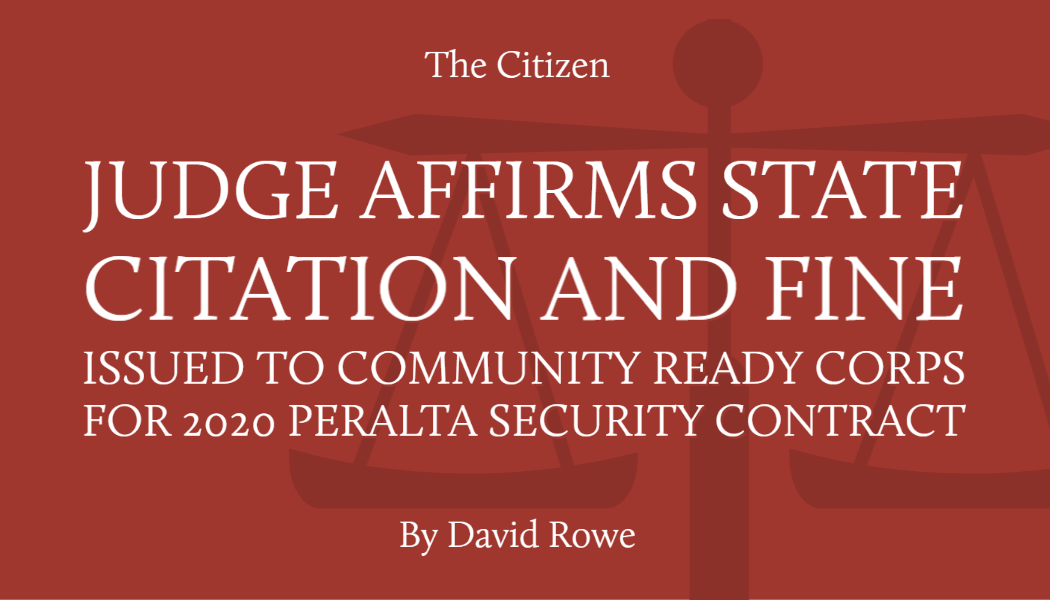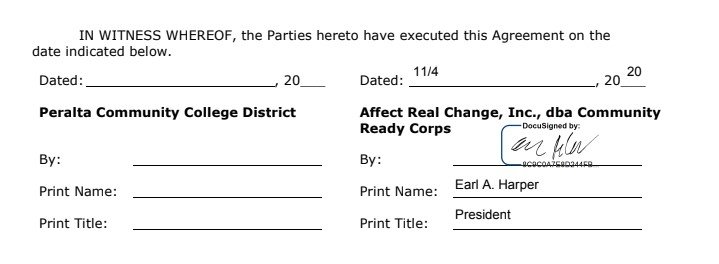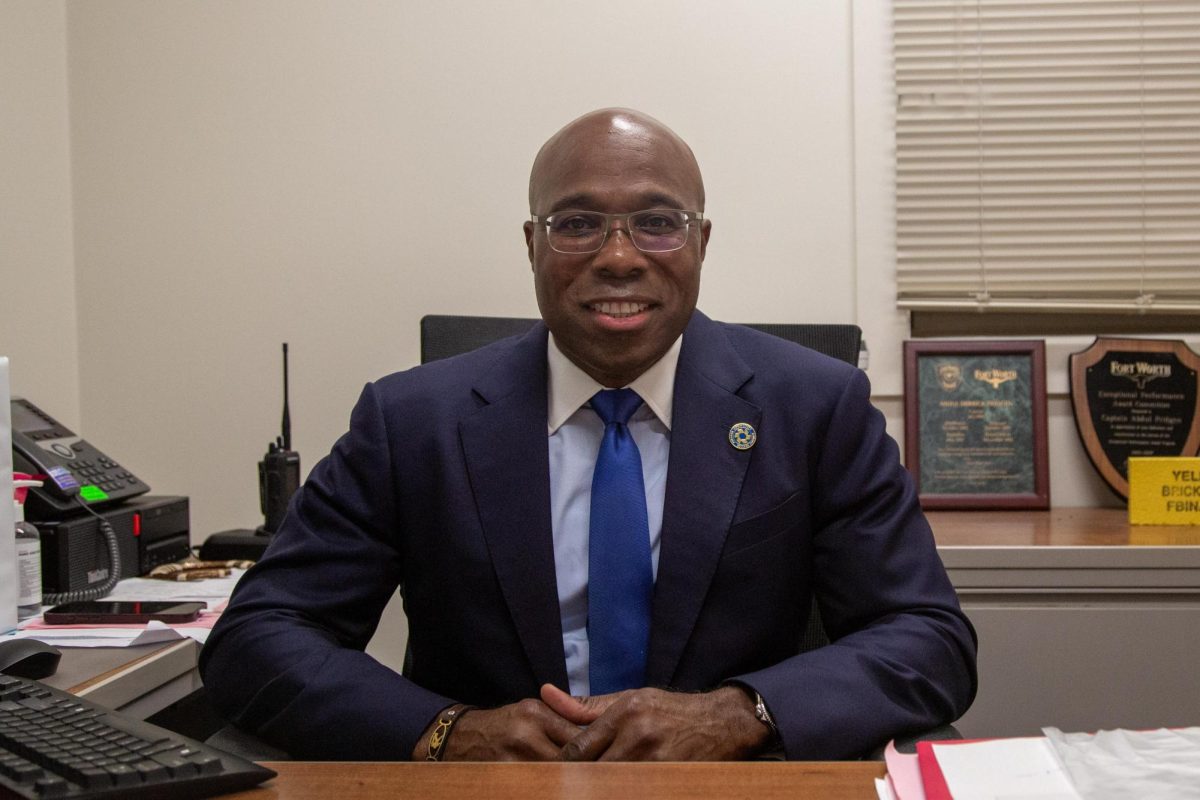
In a proposed decision issued on Dec. 20, Administrative Judge Karen Reichmann affirmed a citation and $5,000 fine issued to Community Ready Corps (CRC) and its founder, Earl Harper, by the California Bureau of Security and Investigative Services (BSIS).
The citation, issued in August 2021, alleged that CRC misrepresented itself as a licensed security firm when it was awarded a $2.1 million contract by the Peralta Community College District (PCCD) in December 2020.
Peter Fournier, the information officer for the California Department of Consumer Affairs (of which BSIS is a part), provided The Citizen with a copy of the proposed decision on Jan. 17 with the admonition that “this decision has not yet been reviewed or adopted” by his agency.
Reichmann’s decision was based on testimony from an administrative hearing conducted online on Dec. 1, 2022. Harper, through his attorney Daniel Siegel of Siegel, Yee, Brunner and Mehta, requested the hearing after an earlier “informal conference” held on Nov. 16, 2021 affirmed the BSIS citation.
BSIS alleged violations of Sections 7582 and 7582.3a of the California Business and Professions Code. These sections prohibit unlicensed individuals from representing themselves as licensees and from engaging “in the business of private patrol operator (PPO)” unless they hold a state-issued license. A PPO license is required to provide security services in the state of California.
BSIS issued a similar citation to Zulu Community Protection Services and its founder, Robert Dabney, in August 2021 based on violations of the same sections. A $5,000 fine was also assessed to Zulu by the agency. According to Fournier, Zulu did not appeal the citation and has not yet paid the fine.
Despite numerous attempts to reach Dabney for comment, The Citizen did not receive a response before this story was published. The Zulu website is no longer accessible and visitors now see a “404 error” message in its place.
The Peralta Board of Trustees approved a $2.1 million contract for CRC and a $2.6 million contract for Zulu Community Protection Services at its Dec. 14, 2020 meeting. Shortly after The Citizen and other news outlets reported that CRC and Zulu did not hold the necessary license to provide security services, the district decided not to move forward with the agreements. An article from The Citizen was entered into evidence in the administrative hearing.
Siegel argued at the Dec. 1 hearing that the citation was issued to CRC in error, contending that Harper never claimed to have a PPO license, did not offer security services to the district, never signed a contract, and did not accept any payments from the district.
Maretta Ward, the Deputy Attorney General representing BSIS, argued the citation was justified since CRC allegedly violated the statutes by simply submitting a proposal for security and safety services to the district, regardless of whether those services were ultimately provided. While the contract approved at the Peralta Board of Trustees meeting and posted on the Board Docs site did not include a signature from anyone at CRC, The Citizen was able to obtain a countersigned copy from the district through a Public Records Act request. The signature above Harper’s name on page eight of the agreement was inserted using DocuSign and dated Nov. 4, 2020, more than a month before the board meeting.

When The Citizen provided Siegel with a copy of the countersigned agreement via email, he responded by saying “the signature page at the end is not signed by the district, and Mr. Harper’s signature appears to have been affixed by a computer program.”
When asked by The Citizen about the district’s use of DocuSign for contract approvals, Mark Johnson, PCCD’s Executive Director of Marketing, Communications, and Public Relations, said Adobe Sign is PCCD’s official electronic signature software.
The Citizen filed a public records act request with the district on Dec 2 asking for all email correspondence between PCCD officials and Mr. Harper related to the DocuSign signature on the contract. More than a month later, the district provided a single email between Atheria Smith, PCCD’s Interim Vice Chancellor for General Services and Anna Jang dated Nov 16, 2020 with the subject line “CRC Security Agreement $2,016,000.” A brief message from Smith referenced the “attached contract” and stated it was urgent and required a requisition.
Smith’s signature appeared twice on the board approved agreement from Dec. 14, 2020. Nine months later, however, she sent a letter to Sam Stodolski, the Deputy Chief of BSIS, stating that “PCCD has never had agreements of any kind with the subject company (CRC).” The letter, dated Sept. 7, 2021, was provided to The Citizen by Siegel.
When asked by The Citizen for clarification on these apparently conflicting statements, Johnson said the district had no comment.
Two witnesses were called during the Dec. 1 hearing. Rico Stephan, an Associate Program Analyst with BSIS, handled the investigation of CRC which led to the issuance of the complaint. Earl Harper, the second witness, testified on his own behalf.
Stephan faced extensive cross-examination from Siegel on a variety of topics, ranging from contract law to the procedures of the PCCD. Stephan said he spoke with Johnson, acting as a spokesperson for the district, as part of his investigation but was not able to speak with Harper or anyone else at CRC despite attempts to reach them using the contact information on the contract.
At one point, Siegel asked Stephan if he knew the identity of the anonymous citizen who filed a complaint with BSIS against CRC. Stephan first said he did but, after checking his records, admitted he did not know the identity of this person.
Siegel speculated it could have been someone from the Alameda County Sheriff’s Office (ACSO) who was “aggrieved by Peralta’s decision to look for private providers.” ACSO had provided security for the district for 20+ years before the Board of Trustees decided not to renew its contract at the end of 2020.
During his sworn testimony, Harper gave his version of events.
“We were very clear with [the district] that we couldn’t provide security services because we were well aware of the rules,” he said.
Harper added that CRC was “willing to come in as ambassadors” or “community liaisons” but could do “nothing of the sort” in terms of security services “which is why we never, ever signed any contracts.”
He also testified the unnamed PCCD officials initially told him a PPO license was not necessary to provide services to the district.
“We told them they were and they said no, they are not. We can bring you on as an ambassador,” Harper said.
Johnson had no comment on Harper’s testimony when asked by The Citizen.
Ward chose not to cross-examine Harper.
In his concluding remarks at the hearing, Siegel pointed out that “the burden of proof is on the agency.” Siegel stated that the “testimony on both sides” confirmed that Harper “never functioned as a licensee” for the PCCD and “never misrepresented his status.” Siegel reprised his argument that “conversations did not reach the level of a contract that was signed by both parties.”
In her closing argument, Ward stated that the language of the contract clearly stated responsibilities for CRC that went beyond the “ambassador” role described by Harper. She pointed out that licensed professionals in California, whether they be doctors, contractors, or security officers, must be “honest, to demonstrate integrity, and to follow applicable rules.”
She contrasted that with Harper’s attempt to “engage in a $2 million contract unlicensed and then, when called on it because it’s a violation of the law, offers this court excuses.”
In a follow-up email to The Citizen, Ward advised that “any decision by the Judge is simply ‘proposed’ and must go to the agency for consideration and/or adoption/rejection. It can take up to 100 days or so to become final.”
The Citizen reached out to Siegel for comment on Reichmann’s proposed decision but did not hear back in time for inclusion in this story.



























